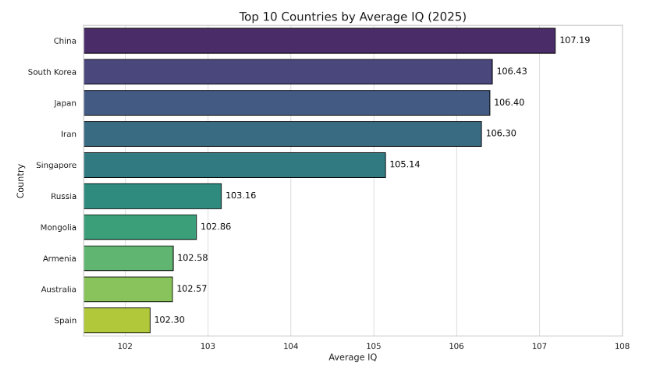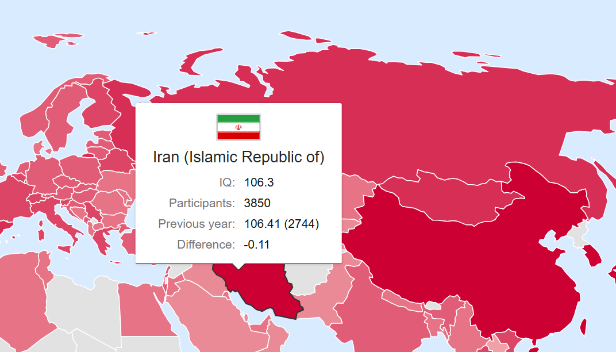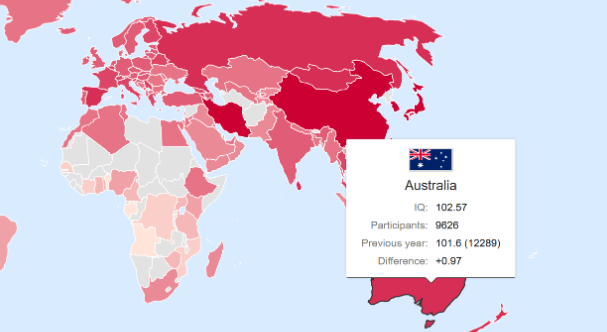China leads global intelligence rankings with an average IQ of 107.19, based on International IQ Test data from 2024. South Korea follows closely with an average of 106.43, while Japan ranks third at 106.4.
East Asian nations dominate the highest IQ rankings, with China, South Korea, and Japan occupying the top three positions. This pattern reflects a strong educational system and a cultural emphasis on academic achievement.
This article discusses the top 10 IQ nations in 2025, explains how national averages are calculated, and highlights the key factors contributing to these rankings.
Top 10 Countries With The Highest Average IQ 2025
The highest IQ scores globally come from East Asian nations, as supported by data from the International IQ test, which analyzed over 1.3 million participants who completed identical assessments in 2024.
| Ranking | Country | Average IQ |
|---|---|---|
| 1. | China | 107.19 |
| 2. | South Korea | 106.43 |
| 3. | Japan | 106.4 |
| 4. | Iran (Islamic Republic of) | 106.3 |
| 5. | Singapore | 105.14 |
| 6. | Russian Federation | 103.16 |
| 7. | Mongolia | 102.86 |
| 8. | Armenia | 102.58 |
| 9. | Australia | 102.57 |
| 10. | Spain | 102.3 |
These rankings reveal clear patterns, with East Asian countries consistently demonstrating high performance while maintaining stable scores across multiple years of testing. These rankings may change over time.

In contrast, some countries have significantly lower average IQs, influenced by various socioeconomic and educational factors.
1. China
China achieves the world’s highest average IQ at 107.19, supported by over 206,000 test participants. High standards in education and a rigorous academic culture play a major role in this result.
Cultural factors, including parental investment in education, competitive academic environments, and societal respect for intellectual achievement, contribute significantly to China’s exceptional performance in intelligence measurements.
2. South Korea
South Korea’s global IQ average, at 106.43, based on nearly 24,000 participants, reflects its transformation into a knowledge-based economy. A demanding education system and nationwide focus on university entrance exams boost analytical skills.
High parental expectations, extensive after-school programs, and cultural emphasis on academic excellence drive South Korea’s sustained performance in international intelligence assessments and educational rankings.
3. Japan
Japan has an average IQ of 106.4, supported by nearly 145,000 participants. The country’s education system strikes a balance between traditional learning methods and modern pedagogical approaches.
Japanese cultural values, which emphasize discipline, continuous improvement, and collective achievement, create environments that foster intellectual development and sustained high performance in cognitive assessments.
4. Iran (Islamic Republic of)
Iran’s average IQ of 106.3 demonstrates a strong intellectual capacity despite regional challenges. The nation’s historical emphasis on education and scholarship continues today.

Persian cultural traditions, which value poetry, mathematics, and philosophy, combined with modern educational investments, contribute to Iran’s position among the world’s highest-performing countries in intelligence measures.
5. Singapore
Singapore has an average IQ of 105.14, based on data from over 5,000 participants. This city‑state’s world-class schooling, bilingual curriculum, and rigorous selection processes strengthen critical thinking skills.
Multilingual education, technology integration, and meritocratic systems create optimal conditions for cognitive development, positioning Singapore as a leading knowledge economy in Southeast Asia.
6. Russian Federation
Russia’s average IQ is 103.16, based on nearly 19,300 participants. This indicates a significant improvement from previous years. The nation’s strong traditions in mathematical and scientific education contribute to its performance.
Russian emphasis on theoretical knowledge, problem-solving skills, and systematic thinking, rooted in Soviet-era educational policies, continues to influence contemporary intellectual development and achievement patterns.
7. Mongolia
Mongolia averages 102.86 IQ with 2,671 testers, representing steady improvement in recent years. The nation’s education system combines traditional knowledge with modern curricula.
Geographic isolation and nomadic cultural heritage have historically emphasized adaptability and problem-solving skills, while modern educational investments support continued cognitive development and intellectual growth.
8. Armenia
Armenia reports an average IQ of 102.58 from 438 participants, showing notable improvement from previous measurements. The nation’s educational system emphasizes mathematics, sciences, and analytical reasoning.
Armenian cultural traditions, which value education, combined with diaspora networks promoting knowledge exchange, create supportive environments for intellectual development and sustained academic achievement across generations.
9. Australia
Australia has an average IQ of 102.57 from 9,626 participants, reflecting its multicultural society and quality education system. The nation attracts global talent and emphasizes innovation.

Australian educational approaches, which emphasize critical thinking, creativity, and practical application, combined with diverse cultural perspectives, foster intellectual development and maintain high standards of cognitive performance.
10. Spain
At 102.30, the average IQ, based on 11,359 participants, shows that Spain leads all EU countries. The nation’s education system has undergone significant modernization efforts over the past years.
Spanish investments in education, technology integration, and European Union educational standards contribute to improved cognitive performance, while cultural emphasis on learning supports intellectual development.
Interesting Read- Discover the remarkable IQ scores of celebrities, including those with low IQ scores.
How Is The Average IQ of a Country Calculated?
The average national IQ is derived by collecting individual IQ test results from people within a country and calculating the mean score. The process involves specific methodologies and sample considerations.
Raven’s Progressive Matrices method is used to calculate the overall IQ of a country. More than 83.18% of countries have a similar average IQ (with a maximum difference of 2 points) compared to their score from the previous year. Probably, these same testing methods have been used to assess the IQ of famous individuals worldwide.
Commonly Used IQ Tests
Numerous IQ assessments are used worldwide, each evaluating different cognitive abilities. Some of the most recognized tests include:
- Wechsler Adult Intelligence Scale (WAIS)
- Wechsler Intelligence Scale for Children (WISC)
- Stanford-Binet Intelligence Scale
- Raven’s Progressive Matrices
- Differential Ability Scales (DAS)
- Cattell Culture Fair Intelligence Test
- Universal Nonverbal Intelligence Test (UNIT)
- Comprehensive Test of Nonverbal Intelligence (CTONI)
Each test may focus on various components like verbal reasoning, working memory, spatial skills, processing speed, and pattern recognition. Most of the time, any of these methods is used to calculate the average IQ of Americans.
Curious about how world leaders compare? Check out this list of U.S. presidents ranked by IQ to see where each one stands.
Conclusion: China Is The Country With The Highest Average IQ Of 107.19
China, South Korea, and Japan have the highest average IQs among the countries listed in this guide. Their strong focus on education and discipline helps students do well in tests and problem-solving tasks across all age groups.
These countries invest in quality teaching, early learning, and STEM subjects. Their cultures also highly value education, which supports long-term learning and mental development among both students and professionals.
Other countries can learn from this by improving their schools, encouraging curiosity, and supporting children early on. Creating a good learning environment can help boost thinking skills and raise overall intelligence levels.
FAQs
The global average IQ is set at 100 by design, with a standard deviation of 15 points.
Several factors influence national IQ averages, including the quality of education, nutrition, healthcare systems, cultural attitudes toward learning, and socioeconomic development.
IQ represents just one aspect of intelligence. Countries can demonstrate their intellectual capacity through innovation, scientific research, and cultural achievements that are not captured by standardized tests.
The national average IQ is calculated by administering standardized tests to representative samples, averaging valid scores, and applying statistical adjustments for demographic factors and testing conditions.
Some Central and sub‑Saharan African countries have lower average IQs, averages under 90. However, data quality varies, and results are often subject to debate.
Differences stem from unequal access to education, health disparities, poverty, cultural bias in testing, and sampling challenges.
